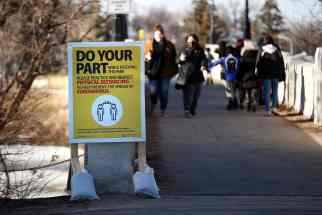Manitoba public service unions facing ultimatum: layoffs or work reductions
Read this article for free:
or
Already have an account? Log in here »
To continue reading, please subscribe:
Monthly Digital Subscription
$0 for the first 4 weeks*
- Enjoy unlimited reading on winnipegfreepress.com
- Read the E-Edition, our digital replica newspaper
- Access News Break, our award-winning app
- Play interactive puzzles
*No charge for 4 weeks then price increases to the regular rate of $19.00 plus GST every four weeks. Offer available to new and qualified returning subscribers only. Cancel any time.
Monthly Digital Subscription
$4.75/week*
- Enjoy unlimited reading on winnipegfreepress.com
- Read the E-Edition, our digital replica newspaper
- Access News Break, our award-winning app
- Play interactive puzzles
*Billed as $19 plus GST every four weeks. Cancel any time.
To continue reading, please subscribe:
Add Free Press access to your Brandon Sun subscription for only an additional
$1 for the first 4 weeks*
*Your next subscription payment will increase by $1.00 and you will be charged $16.99 plus GST for four weeks. After four weeks, your payment will increase to $23.99 plus GST every four weeks.
Read unlimited articles for free today:
or
Already have an account? Log in here »
Hey there, time traveller!
This article was published 14/04/2020 (2064 days ago), so information in it may no longer be current.
Premier Brian Pallister is telling Manitoba’s public service unions that the only way they can avoid layoffs amid the coronavirus pandemic is to accept reduced workweeks for non-essential employees.
Pallister raised the issue of a reduced work schedule Tuesday morning when he announced the province will cover the salaries of front-line health-care workers who miss work for 14 days to self-isolate if they have been exposed to COVID-19.
The reduced workweek is an “all hands on deck approach to fighting COVID-19,” the premier said at a news conference.
The news was a jolt for unions that have been at loggerheads with the Pallister government for most of the four years its been in power.
“We were told that the only way to avoid significant layoffs would be to voluntarily enter into work-sharing agreements where non-essential staff would have their workweek reduced to as little as two days per week,” said Michelle Gawronsky, president of the Manitoba Government and General Employees Union.
Provincial officials were unable to say which public services they consider non-essential, Gawronsky said.
Affected workers would get Employment Insurance for the lost work days, she said. For those who earn less than $54,000 annually, that would mean keeping about 70 per cent of their pay and avoiding a layoff. But it would only be possible if the federal government agreed to make the province eligible for the EI program, she said.
The premier told reporters the plan is required in order to shift resources to where they’re needed most right now — the health-care system and fighting COVID-19.
“We were told that the only way to avoid significant layoffs would be to voluntarily enter into work-sharing agreements where non-essential staff would have their workweek reduced to as little as two days per week.”
– Michelle Gawronsky, president of the Manitoba Government and General Employees Union
Pallister said the work reduction would be a temporary measure to get through an economic crisis brought on by the pandemic that has resulted in shrinking provincial tax revenue, soaring health-care costs and a projected $5-billion provincial deficit this year.
“It’s far preferable in our minds to layoffs and a way in which we can help keep people at work part of the time,” Pallister said.
The move left unions scrambling for answers to how it will all play out.

“I was pretty surprised to hear about that today,” Manitoba Federation of Labour president Kevin Rebeck said, adding more questions remained after a conference call with the premier.
Pallister has said several times in recent days that private-sector workers have been hit harder by restrictions imposed due to the pandemic, but that doesn’t mean slashing the public sector will make things better, Rebeck said. The goal should be to keep people employed as much as possible.
“We’re facing an unprecedented health crisis,” Rebeck said.
“Right now, more Manitobans than ever are counting on public services to be there. More people are calling on EIA (Employment and Income Assistance), Rent Assist and Child and Family Services than ever before.”
“It will take money out of the pockets of families at a time when they need it most and it will put more pressure on an already strained economy.”
– NDP Leader Wab Kinew
NDP Opposition leader Wab Kinew said Pallister’s plan will make things worse for Manitobans who are already struggling to pay their bills.
“It will take money out of the pockets of families at a time when they need it most and it will put more pressure on an already strained economy,” Kinew said in an email.
The premier said he’s spoken to Prime Minister Justin Trudeau and Deputy Prime Minister Chrystia Freeland about the EI proposal, adding it wouldn’t require a change in federal legislation. It would make use of the employment insurance program that government has paid into the last 10 years, with more than $2 billion in employer and employee contributions, he said.

He urged union leaders to join him in lobbying the federal government to allow “this common-sense sharing program” to be used in the public sector, much like it’s already in use throughout the private sector. He said a Manitoba government employee getting paid two days a week by the province and three days a week by EI for four months wouldn’t be a bad deal for a civil servant “in the middle of a Manitoba summer with their kids at home.”
Manitoba a standout on part-time EI
OTTAWA — The Pallister government may be the only jurisdiction to consider putting its public servants onto part-time employment insurance.
In a Tuesday afternoon survey of the nine other provinces, the governments of Saskatchewan, Alberta, British Columbia, Ontario, Quebec, New Brunswick and Newfoundland and Labrador said they were not exploring such a move. Other provinces did not respond by deadline. Many of the provinces said they were reallocating staff, and some had undergone hiring freezes.
OTTAWA — The Pallister government may be the only jurisdiction to consider putting its public servants onto part-time employment insurance.
In a Tuesday afternoon survey of the nine other provinces, the governments of Saskatchewan, Alberta, British Columbia, Ontario, Quebec, New Brunswick and Newfoundland and Labrador said they were not exploring such a move. Other provinces did not respond by deadline. Many of the provinces said they were reallocating staff, and some had undergone hiring freezes.
Municipalities across Canada have laid off workers, or kept them as unpaid staff, though it appear no large cities have had their staff undertake part-time EI.
Under the federal EI Work Sharing program, employers can implement “a voluntary reduction in hours (…) to retain a full work force on a reduced work week, rather than laying off part of his or her work force,” according to a Service Canada website.
It’s unclear if that’s the program Pallister intends to use, and if provincial governments would qualify for it.
—Dylan Robertson
Pallister told reporters the 14-day paid leave will apply to all front-line workers — “people who make the beds and clean the floors and washrooms and do the front-line work of protecting people when they’re in our facilities.”
He did not specify if the paid leave includes nursing home and home care workers, said Shannon McAteer, CUPE health care co-ordinator for Manitoba. “We’re happy they’re implementing this, but what does it mean?”
Meanwhile, social service providers that receive provincial grants are especially nervous right now, said Bob Moroz, president of the Manitoba Association of Health Care Professionals.
The union represents workers at several of them, including the Society for Manitobans with Disabilities, the Rehabilitation Centre for Children and the Aboriginal Health and Wellness Centre.
“A lot of these places are very much on edge,” Moroz said. “We need to make sure these services aren’t on the chopping block.”
carol.sanders@freepress.mb.ca

Our newsroom depends on a growing audience of readers to power our journalism. If you are not a paid reader, please consider becoming a subscriber.
Our newsroom depends on its audience of readers to power our journalism. Thank you for your support.
History
Updated on Tuesday, April 14, 2020 8:14 PM CDT: Fixes typo.
Updated on Tuesday, April 14, 2020 8:41 PM CDT: fixes typo
Updated on Tuesday, April 14, 2020 10:02 PM CDT: Updates related items







